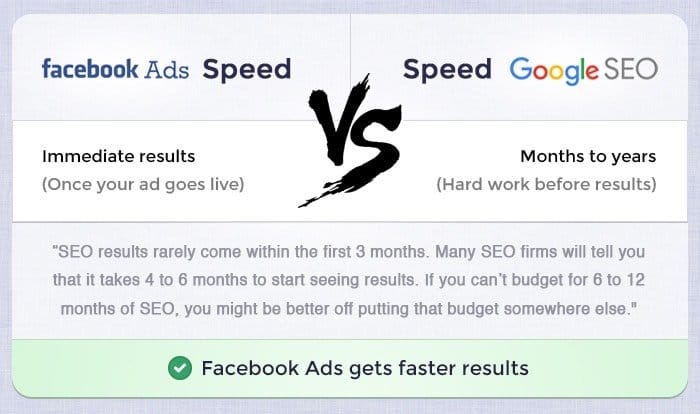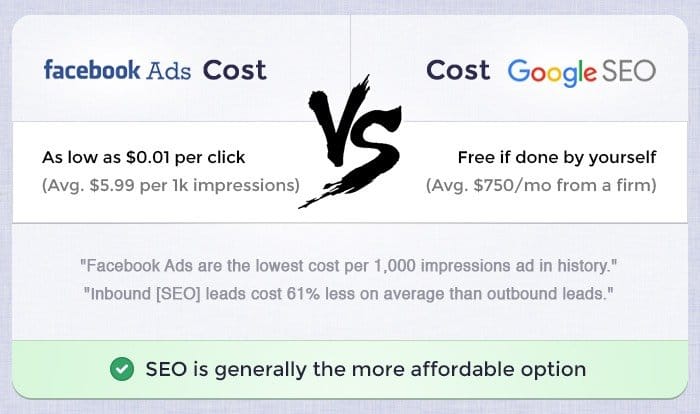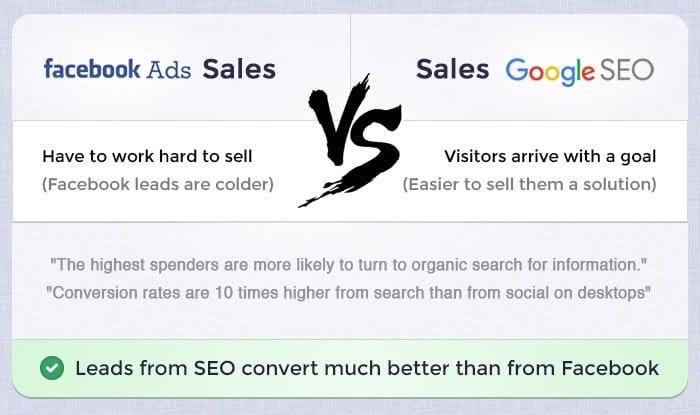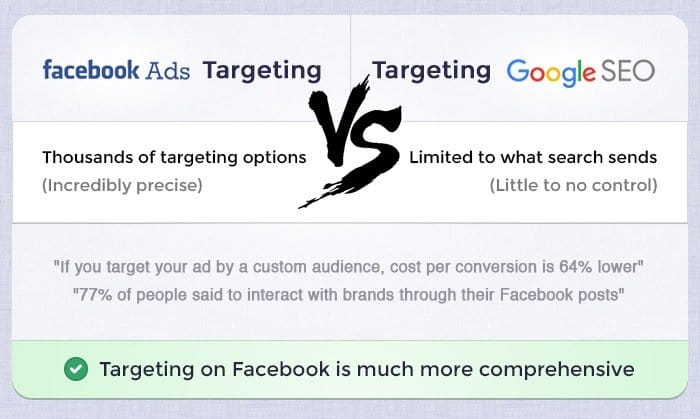 Written by ContentPowered.com
Written by ContentPowered.comTwo primary marketing channels for webmasters these days are SEO and social. Though, let’s be honest here; when we talk about social marketing, we’re mostly just talking about Facebook. Sometimes Twitter squeezes in, and sometimes LinkedIn, Google+, and a few others pop their heads in, but Facebook is where it’s at.
There’s a bit of a misconception out there that you should focus your efforts on one or the other. Facebook marketing is part of an overall large marketing plan. So is SEO, which is itself comprised of onsite factors and external content marketing and link building.
Savvy marketers know that you can do all of this together. You can do paid ads on and off Facebook, you can do link building that involves both social networks and blogs, you can work with organic SEO, and a lot more. However, for the sake of this post – and the graphic – we’re comparing Facebook marketing with organic SEO.
Embed this image on your site
This code links back to Boostlikes.com

Embed this image on your site
This code links back to Boostlikes.com
Result Speed
So the first thing you might be wondering when you compare the two is just how fast they work. While the infographic only covers two points, there are actually four to consider.
- Organic Facebook marketing via posting as a page and in groups.
- Paid advertising on Facebook via Facebook Ads.
- Organic SEO using free methods, growth hacks, and content marketing.
- Paid SEO using PPC ads on various services, including Google.
Organic Facebook marketing can more or less be ignored. It’s extremely slow to build up and, despite posting about it all the time, it’s very difficult to grow a web presence via Facebook without investing in ads.
By contrast, Facebook ads are extremely good. With nearly two billion people you can reach, and hundreds of targeting options you can set, you have an extreme amount of influence over your growth with just a few bucks. I would argue that Facebook ads are some of the best around; Google ads can almost compare, and other ad networks come in as a distant third.
Meanwhile, organic SEO is the ultimate in “slow build” marketing. A good white hat campaign will take a while – months, generally – to show valuable results. However, it’s like compound interest in an investment account. The longer you let it go and the more you invest in the account, the more it builds upon itself. It’s slow, but has no theoretical cap on progress beyond the size of your industry, and even then, a powerful brand can expand their industry.
So to compare the best way to use SEO and the best way to use Facebook, you have a dichotomy. Facebook wins in terms of pure speed. You start to see results instantly, the moment your ad goes live, and they continue for as long as you’re willing to put money into the system. Meanwhile, SEO takes a long time to build, from months to even years before you see comparable results to the Facebook ads.
That’s just another reason to use them in tandem. Boost the short term gains with Facebook, while you wait for your long term compounding value to reach critical mass.
Cost of Growth
It’s always hard to estimate the costs of marketing. There are a thousand little factors that go into how successful you are with your marketing, and the cost of any given factor can rise or fall based on other factors in a web that makes it all hard to control. For example, we found that Facebook ads tend to run around $6 for 1,000 impressions, and you can go as low as penny clicks, but how effective are those clicks? The lower the cost, the less effective the ads, to a certain point. Once you peak, though, then costs continue to rise while the value of the impressions or clicks does not.
However, there’s one thing that’s certain; using Facebook these days is guaranteed to cost money. Facebook is, more or less, just a paid ad platform at this point. Even if you’re getting penny clicks – and you probably shouldn’t be – you’re still paying money.
What about organic SEO? I say organic as if it’s all home grown, all DIY, but it’s not, not necessarily. You can certainly handle it all yourself. You can write your blog posts, you can reach out to customers and bloggers and influencers, you can work on link building, you can do it all. It takes a lot of time, and time is a very real cost when you’re running a business. That’s why employees exist, but having employees do it for you is not free. You’re paying them.
You can also hire an SEO firm to do the work for you. Professionals who have processes and resources you don’t have, and experience you haven’t gained, working for a fee. You can end up paying $750 a month for their services, on average. Some high tier SEO firms charge orders of magnitude more, and their service is entirely worth it. Others charge less, and if you’re a small business with a small business budget, you might be stuck with them. That’s not to say they’re bad, but they may be lacking in some way compared to the big names.
Facebook ads are some of the cheapest in history as far as cost for value is concerned, but a good, slow burn SEO campaign can return immense value in exchange for nothing more than time. On the other hand, paying to outsource either one can skyrocket costs.
Conversions
Nothing matters if you don’t get conversions. You could build a Facebook page with a million followers but if none of them ever buy anything from your website, click your affiliate links, or otherwise make you money, who cares? You’re getting nothing out of it, and you probably spent quite a bit getting to that point.
The same goes for organic SEO. You could have a million monthly visitors but if you haven’t monetized them, you’re not going to benefit from them. In fact, depending on your web host, that might end up costing you more. Sure, pay per view ads exist, but they don’t get you much. You really need a high class monetization scheme, with affiliate links, product sales, drop shipping, or some other form of value.
In a general sense, SEO wins in the conversion race. When someone arrives on your Facebook page, they probably just saw an interesting ad or link. They’re not necessarily doing anything to benefit you, they just want to read some interesting content. In terms of lead generation, they’re pretty cold leads. It takes quite a bit to turn a Facebook visitor into a website visitor into a product buyer.
By contrast, the people arriving on your site directly via SEO tend to be warmer leads. They have an intent when they visit, either to gain information or to explore your products. Something directly related to their current browsing brought them to you. It might be a specific purchase-intent query from Google. It might have been such a query that led to a page that linked to you. It might have even been your product showing up in Google’s shopping results.
Conversion rates are as much as ten times higher from search than they are from social, at least with desktop marketing. Mobile marketing rates are a bit different. Meanwhile, the biggest spenders are doing Google searches to find the best possible purchases. They aren’t making impulse buys through Facebook.
Targeting
Targeting is more or less something restricted to paid ads, and even then, it’s very limited on any platform that isn’t Facebook. Facebook is a holy grail for marketers simply because of the insane amounts of data the site has harvested about its users. If you’ve never looked into the factors that you can target or restrict with Facebook ads – and even organic posts – you might be shocked.
Targeting on organic SEO is a much different story. It’s not even really targeting in the same sense. You have keyword research and topic choice to guide people to your content, but you’re not reaching out to specific groups of people and saying “hey, I have something you might like.” You’re putting it out there and hoping people find it.
Targeting on Facebook is extremely important to learn. Good targeting drops your cost per conversion, increases your visibility, and grows your audience in a more targeted way. Bad targeting increases costs, decreases the effectiveness of marketing all around, and hurts your brand.
However, targeting works to help your organic marketing as a second degree from Facebook. After all, the more targeted your Facebook audience and ads are, the more targeted the audience that goes from Facebook to your website. Plus, Facebook ads pointing at your website get to bypass SEO and apply the targeting directly.
Facebook wins this war hands down.
Stacking Up
Facebook is broadly used by 84% of businesses as of some recent studies. SEO, meanwhile, is even more essential, used by 96% of marketers. It stands to reason; SEO is older and widely viewed as essential for brands, while Facebook – and social in general – is ignored occasionally by businesses that don’t have the time, the money, or the young minds necessary to grasp the value of social media.
Over 38% of internet users use Facebook. The network has 1.6 billion monthly active users, which is a significant portion of the population of our entire planet. Further, over half of all Facebook usage is done via mobile devices. People spend more time on Facebook than on any other social network, with Tumblr the only one coming close.
At the same time, Facebook is not the source of commerce. It’s a source of brand awareness, recognition, and offers that help grow your customer base. Actual purchases come from web searches for products and solutions to problems. 81% of B2B purchases and a huge number of B2C purchases come from web search initially. Facebook only serves to hook interested users and to keep them coming back for repeat purchases.
Once again, despite pitting the two against on another, Facebook and organic SEO are both parts of a single robust marketing plan. Paid ads are a great short term solution, and they supplement everything else you do. Organic SEO is a long slow build, that you can use social media for retention after attraction. You can use Facebook tracking pixels to record the people who visit but don’t convert, and you can use that as a custom audience for ads on Facebook later; a tracked audience like that has a much higher conversion rate than even a well targeted broad audience.
There are so many possible interactions between the two that it’s impossible to separate them and justify using just one. Weave them together in a seamless whole and you’ll be all the better for it.





Awesome post. That taught me a lot. Basically One is active specific targeting of your ideal customers to keep your product top of mind, The other is long term and converts clients at a %1000 better rate. The harmony between the two is really where your marketing efforts bear the most fruit.